These notes explain how cards from Shadows over Innistrad work in Two-Headed Giant. The explanations assume you’re already familiar with how these cards work in a normal game. You can find the regular release notes here.
2HG has a few quirks, mostly concerning the combat phase and life total changes, but the majority of cards work as you’d expect. The golden rule of 2HG is: “You” still refers to you alone, not both you and your teammate. For example, abilities that boost “creatures you control” or abilities that let “you” draw cards. See the 2HG FAQ if you want to know more about the rules of the format.
If you’re going to play in a 2HG prerelease you should also check out the 2HG Hidden Gems that shows which cards to look out for.
GENERAL NOTES
Uncommon Delirium cycle
These cards are most likely to generate the most questions, both because there are five of them and they do not work like many would expect. If you judge a prerelease and talk about specific cards in your opening speech, these are the most important ones to mention.





Topplegeist | Manic Scribe | Tooth Collector | Gibbering Fiend | Obsessive Skinner
- These cards all trigger “at the beginning of each opponent’s upkeep”. In 2HG this means that they trigger twice in your opponents’ shared upkeep, once for each opponent.
- Those triggers are tied to that specific opponent, so if the card asks for a “target creature that player controls” the two triggers have to target a creature from a different opponent. You can’t target one creature twice or two different creatures from the same opponent. The exception is Obsessive Skinner, the only one that doesn’t say “that player”, so with those triggers you can target the same creature twice.
Werewolves
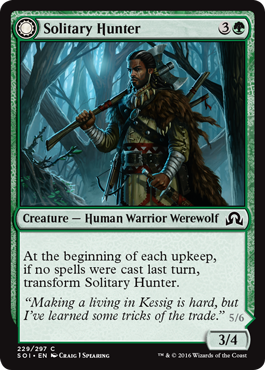
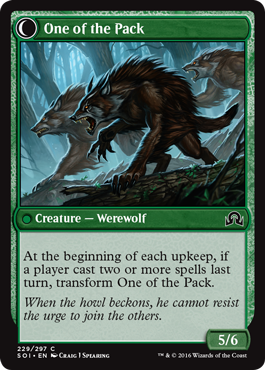
- The night side transform condition looks at each player individually, so it doesn’t trigger if both opponents play one spell each.
Saboteurs
Saboteur is a nickname for creatures with an ability that triggers when they deal (combat) damage to an opponent. Most sets have a few saboteur cards.
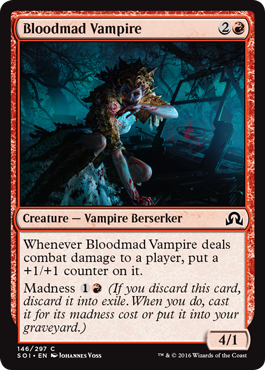
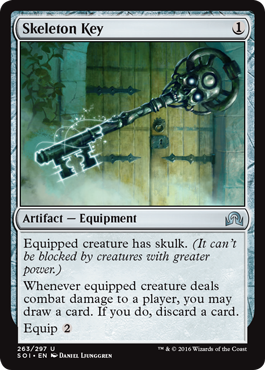
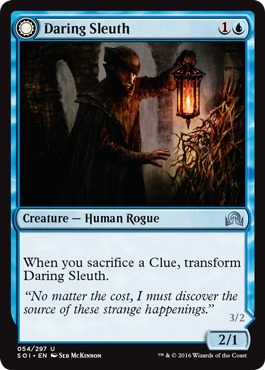
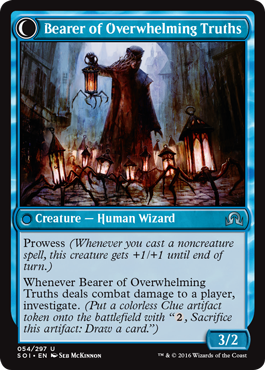
Bloodmad Vampire | Skeleton Key | Daring Sleuth
- Even though you attack the defending team rather than a specific player when declaring attackers, combat damage is still dealt to a single defending player of your choice, so these abilities will trigger only once.
Golden Rule Corner
“You” still refers to you alone, not both you and your teammate.
In this segment we’ll note which new mechanics follow the golden rule.
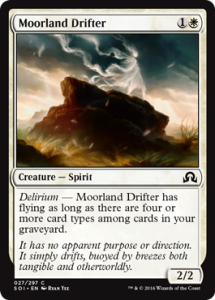
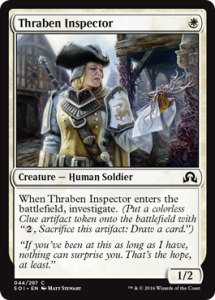
Delirium, Investigate
- Delirium looks at your graveyard. Investigate puts a clue token on the battlefield under your control (even though it doesn’t mention that in the reminder text).
CARD-SPECIFIC NOTES
 Asylum Visitor
Asylum Visitor
- Like the uncommon Delirium cycle, this card will trigger twice, once for each player.
- If it’s your turn and both of you have no cards in hand, in which order you resolve the triggers is important. If you let the one checking your teammate resolve first, you will have a card in your hand when the one checking you wants to resolve. If you want to draw 2 cards, resolve your own one first. If you don’t want to lose 2 life, resolve your teammate’s one first.

Fevered Visions
- Like the uncommon Delirium cycle, this card will trigger twice, once for each player.
- Both opponents count as “your opponent”, so the damage check is done on both.

Flameblade Angel
- Your opponents can decide which defending player to deal combat damage to in the combat damage step, so they can simply always choose your teammate, meaning the “deals damage to you” part won’t be very relevant for combat damage in 2HG.
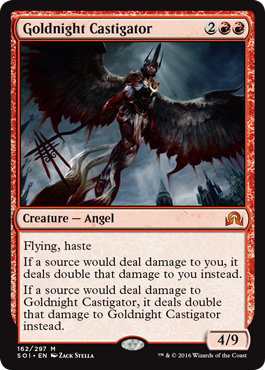
Goldnight Castigator
- Your opponents can decide which defending player to deal combat damage to in the combat damage step, so they can always choose you, meaning the “deal damage to you” part could be very painful in 2HG.

Jace, Unraveler of Secrets
- The emblem looks at each opponent separately, so the first spell from each opponent will be countered each turn.

Ongoing Investigation
- The first ability triggers once per player you’re dealing combat damage to, so this can trigger twice in 2HG.
- You do not choose which opponent an unblocked attacker deals combat damage to until the Combat Damage Step. This means it’s undecided yet when the defending team chooses how to block. So for example, if you have three attacking creatures and the defending team can block only one of them, you can later assign the combat damage of whichever two are unblocked to one opponent each to get two triggers.

Sorin, Grim Nemesis
- In 2HG your life total is equal to your team’s life total, so the highest life total among all players is the highest life total among all teams.
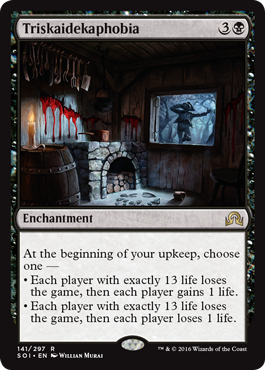
Triskaidekaphobia
- In 2HG your life total is the same as your team’s life total so a team with 13 life loses the game.
- There’s only one trigger, not one for each player, so the check is done only once. A team at 14 life with losing life chosen first survives the check, then goes to 12.
